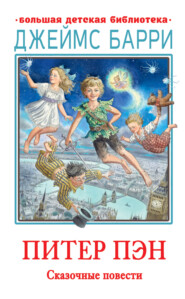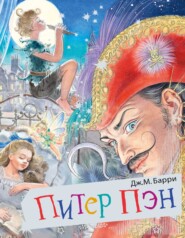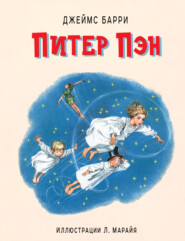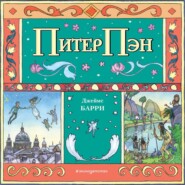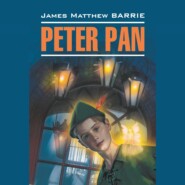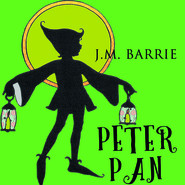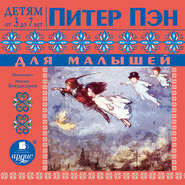По всем вопросам обращайтесь на: info@litportal.ru
(©) 2003-2025.
✖
The Little Minister
Настройки чтения
Размер шрифта
Высота строк
Поля
It was only the howling of the dog, which had recognized its master and was peering over the bank, the body quivering to jump, but the legs restless with indecision.
“If we were down there,” Gavin said, “we could hold him secure till rescue comes. It is no great jump.”
“How far would you make it? I saw him again!”
“It looked further that time.”
“That’s it! Sometimes the ground he is on looks so near that you think you could almost drop on it, and the next time it’s yards and yards awa. I’ve stood ready for the spring, Mr. Dishart, a dozen times, but I aye sickened. I daurna do it. Look at the dog; just when it’s starting to jump, it pulls itsel’ back.”
As if it had heard the shepherd, the dog jumped at that instant.
“It sprang too far,” Gavin said.
“It didna spring far enough.”
They waited, and presently the mist thinned for a moment, as if it was being drawn out. They saw the earl, but there was no dog.
“Poor brute,” said the shepherd, and looked with awe at Gavin.
“Rintoul is slipping into the water,” Gavin answered. “You won’t jump?”
“No, I’m wae for him, and – ”
“Then I will,” Gavin was about to say, but the shepherd continued, “And him only married twa hours syne.”
That kept the words in Gavin’s mouth for half a minute, and then he spoke them.
“Dinna think o’t,” cried the shepherd, taking him by the coat. “The ground he is on is slippery. I’ve flung a dozen stanes at it, and them that hit it slithered off. Though you landed in the middle o’t, you would slide into the water.”
“He shook himsel’ free o’ me,” the shepherd told afterward, “and I saw him bending down and measuring the distance wi’ his een as cool as if he was calculating a drill o’ tatties. Syne I saw his lips moving in prayer. It wasna spunk he needed to pray for, though. Next minute there was me, my very arms prigging wi’ him to think better o’t, and him standing ready to loup, his knees bent, and not a tremble in them. The mist lifted, and I – Lads, I couldna gie a look to the earl. Mr. Dishart jumped; I hardly saw him, but I kent, I kent, for I was on the bank alane. What did I do? I flung mysel’ down in a sweat, and if een could bore mist mine would hae done it. I thocht I heard the minister’s death-cry, and may I be struck if I dinna believe now that it was a skirl o’ my ain. After that 357 there was no sound but the jaw o’ the water; and I prayed, but no to God, to the mist to rise, and after an awful time it rose, and I saw the minister was safe; he had pulled the earl into the middle o’ the bit island and was rubbing him back to consciousness. I sweat when I think o’t yet.”
The Little Minister’s jump is always spoken of as a brave act in the glen, but at such times I am silent. This is not because, being timid myself, I am without admiration for courage. My little maid says that three in every four of my poems are to the praise of prowess, and she has not forgotten how I carried her on my shoulder once to Tilliedrum to see a soldier who had won the Victoria Cross, and made her shake hands with him, though he was very drunk. Only last year one of my scholars declared to me that Nelson never said “England expects every man this day to do his duty,” for which I thrashed the boy and sent him to the cooling-stone. But was it brave of Gavin to jump? I have heard some maintain that only misery made him so bold, and others that he jumped because it seemed a fine thing to risk his life for an enemy. But these are really charges of cowardice, and my boy was never a coward. Of the two kinds of courage, however, he did not then show the nobler. I am glad that he was ready for such an act, but he should have remembered Margaret and Babbie. As it was, he may be said to have forced them to jump with him. Not to attempt a gallant deed for which one has the impulse, may be braver than the doing of it.
“Though it seemed as lang time,” the shepherd says, “as I could hae run up a hill in, I dinna suppose it was many minutes afore I saw Rintoul opening and shutting his een. The next glint I had o’ them they were speaking to ane another; ay, and mair than speaking. They were quarrelling. I couldna hear their words, but there was a moment when I thocht they were to 358 grapple. Lads, the memory o’ that’ll hing about my deathbed. There was twa men, edicated to the highest pitch, ane a lord and the other a minister, and the flood was taking awa a mouthful o’ their footing ilka minute, and the jaws o’ destruction was gaping for them, and yet they were near fechting. We ken now it was about a woman. Ay, but does that make it less awful?”
No, that did not make it less awful. It was even awful that Gavin’s first words when Rintoul opened his eyes and closed them hastily were, “Where is she?” The earl did not answer; indeed, for the moment the words had no meaning to him.
“How did I come here?” he asked feebly.
“You should know better than I. Where is my wife?”
“I remember now,” Rintoul repeated several times. “Yes, I had left the Spittal to look for you – you were so long in coming. How did I find you?”
“It was I who found you,” Gavin answered. “You must have been swept away by the flood.”
“And you too?”
In a few words Gavin told how he came to be beside the earl.
“I suppose they will say you have saved my life,” was Rintoul’s commentary.
“It is not saved yet. If help does not come, we shall be dead men in an hour. What have you done with my wife?”
Rintoul ceased to listen to him, and shouted sums of money to the shepherd, who shook his head and bawled an answer that neither Gavin nor the earl heard. Across that thundering water only Gavin’s voice could carry, the most powerful ever heard in a Thrums pulpit, the one voice that could be heard all over the Commonty during the time of the tent-preaching. Yet he never roared, as some preachers do of whom we say, “Ah, if they could hear the Little Minister’s word!”
Gavin caught the gesticulating earl by the sleeve, 359 and said, “Another man has gone for ropes. Now, listen to me; how dared you go through a marriage ceremony with her, knowing her already to be my wife?”
Rintoul did listen this time.
“How do you know I married her?” he asked sharply.
“I heard the cannon.”
Now the earl understood, and the shadow on his face shook and lifted, and his teeth gleamed. His triumph might be short-lived, but he would enjoy it while he could.
“Well,” he answered, picking the pebbles for his sling with care, “you must know that I could not have married her against her will. The frolic on the hill amused her, but she feared you might think it serious, and so pressed me to proceed with her marriage to-day despite the flood.”
This was the point at which the shepherd saw the minister raise his fist. It fell, however, without striking.
“Do you really think that I could doubt her?” Gavin said compassionately, and for the second time in twenty-four hours the earl learned that he did not know what love is.
For a full minute they had forgotten where they were. Now, again, the water seemed to break loose, so that both remembered their danger simultaneously and looked up. The mist parted for long enough to show them that where had only been the shepherd was now a crowd of men, with here and there a woman. Before the mist again came between the minister had recognized many members of his congregation.
In his unsuccessful attempt to reach Whinbusses, the grieve had met the relief party from Thrums. Already the weavers had helped Waster Lunny to stave off ruin, and they were now on their way to Whinbusses, keeping together through fear of mist and water. Every 360 few minutes Snecky Hobart rang his bell to bring in stragglers.
“Follow me,” was all the panting grieve could say at first, but his agitation told half his story. They went with him patiently, only stopping once, and then excitedly, for they come suddenly on Rob Dow. Rob was still lying a prisoner beneath the tree, and the grieve now remembered that he had fallen over this tree, and neither noticed the man under it nor been noticed by the man. Fifty hands released poor Dow, and two men were commissioned to bring him along slowly while the others hurried to the rescue of the earl. They were amazed to learn from the shepherd that Mr. Dishart also was in danger, and after “Is there a woman wi’ him?” some cried, “He’ll get off cheap wi’ drowning,” and “It’s the judgment o’ God.”
The island on which the two men stood was now little bigger than the round tables common in Thrums, and its centre was some feet farther from the bank than when Gavin jumped. A woman, looking down at it, sickened, and would have toppled into the water, had not John Spens clutched her. Others were so stricken with awe that they forgot they had hands.
Peter Tosh, the elder, cast a rope many times, but it would not carry. The one end was then weighted with a heavy stone, and the other tied round the waists of two men. But the force of the river had been underestimated. The stone fell short into the torrent, which rushed off with it so furiously that the men were flung upon their faces and trailed to the verge of the precipice. A score of persons sprang to their rescue, and the rope snapped. There was only one other rope, and its fate was not dissimilar. This time the stone fell into the water beyond the island, and immediately rushed down stream. Gavin seized the rope, but it pressed against his body, and would have pushed him off his feet had not Tosh cut it. The trunk of the tree 361 that had fallen on Rob Dow was next dragged to the bank and an endeavor made to form a sloping bridge of it. The island, however, was now soft and unstable, and, though the trunk was successfully lowered, it only knocked lumps off the island, and finally it had to be let go, as the weavers could not pull it back. It splashed into the water, and was at once whirled out of sight. Some of the party on the bank began hastily to improvise a rope of cravats and the tags of the ropes still left, but the mass stood helpless and hopeless.
“You may wonder that we could have stood still, waiting to see the last o’ them,” Birse, the post, has said to me in the school-house, “but, dominie, I couldna hae moved, magre my neck. I’m a hale man, but if this minute we was to hear the voice o’ the Almighty saying solemnly, ‘Afore the clock strikes again, Birse, the post, will fall down dead of heart disease,’ what do you think you would do? I’ll tell you. You would stand whaur you are, and stare, tongue-tied, at me till I dropped. How do I ken? By the teaching o’ that nicht. Ay, but there’s a mair important thing I dinna ken, and that is whether I would be palsied wi’ fear like the earl, or face death with the calmness o’ the minister.”
Indeed, the contrast between Rintoul and Gavin was now impressive. When Tosh signed that the weavers had done their all and failed, the two men looked in each other’s faces, and Gavin’s face was firm and the earl’s working convulsively. The people had given up attempting to communicate with Gavin save by signs, for though they heard his sonorous voice, when he pitched it at them, they saw that he caught few words of theirs. “He heard our skirls,” Birse said, “but couldna grip the words ony mair than we could hear the earl. And yet we screamed, and the minister didna. I’ve heard o’ Highlandmen wi’ the same gift, so that they could be heard across a glen.”
“We must prepare for death,” Gavin said solemnly to the earl, “and it is for your own sake that I again ask you to tell me the truth. Worldly matters are nothing to either of us now, but I implore you not to carry a lie into your Maker’s presence.”
“I will not give up hope,” was all Rintoul’s answer, and he again tried to pierce the mist with offers of reward. After that he became doggedly silent, fixing his eyes on the ground at his feet. I have a notion that he had made up his mind to confess the truth about Babbie when the water had eaten the island as far as the point at which he was now looking.
Chapter Forty-Four.
END OF THE TWENTY-FOUR HOURS
Out of the mist came the voice of Gavin, clear and strong —
“If you hear me, hold up your hands as a sign.”
They heard, and none wondered at his voice crossing the chasm while theirs could not. When the mist cleared, they were seen to have done as he bade them. Many hands remained up for a time because the people did not remember to bring them down, so great was the awe that had fallen on all, as if the Lord was near.









